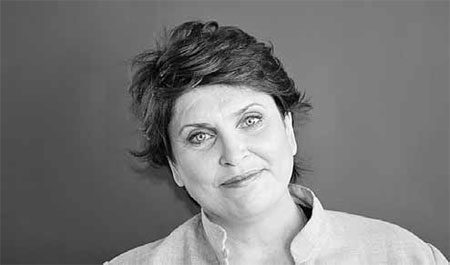The green goddess
Updated: 2013-03-31 07:40
By Rebecca Lo(China Daily)
|
|||||||||
|
Lizette Smook is working with a South Korean scientist to develop new applications. Provided to China Daily |
Talking to the Cape Town native is a little like being in the eye of a typhoon. Her piercing blue eyes light up as she switches from one subject to another without much concern whether her listeners are on board or lost somewhere in the Kruger.
"I love jumping from one thing to the next," admits Lizette Smook, the founder of InnovAsians. "Even my staff tells me that I speak too quickly. I have the type of personality that loves to be busy. I love going to China: Sichuan for the food, Harbin for the ice sculptures, the remoteness of Inner Mongolia. My latest fascination is with Guangxi."
Smook has traveled across China for nearly 20 years, initially to visit factories when she was sourcing manufacturers as a technical expert in the corporate world of apparel, and now to find green manufacturers for InnovAsians, a company she founded at the end of 2006.
Originally from Paarl, a town just outside of Cape Town, Smook grew up in the country's wine region and has always been interested in science. Armed with a degree in chemistry and physics, her first job was to set up the testing laboratory of a large textiles company.
She worked for Woolworths in South Africa and first came to Hong Kong as part of a buying trip that included visits to Bangkok, Seoul and Taipei. The year was 1991 and she immediately knew that she wanted to live in China.
"The vibrancy when I arrived in Hong Kong was contagious," she recalls. "Landing in Kai Tak airport reminded me a little of Cape Town. There was water everywhere."
She got her chance to relocate to Hong Kong in 1996 when she was headhunted by Nike.
She started InnovAsians with her own money and sourced building blocks for the raw materials through four channels: recycled products, agricultural waste, renewable materials and by making products biodegradable.
Her clients have included Shangri-La Hotels & Resorts, who use the husks from rice, an agricultural waste, for a light plastic-like material molded into dishware ubiquitous in its staff canteens globally. Fibers from sugar cane have been transformed into Bagasse rice box containers for Maxim's Catering.
Smook sources her suppliers by reading about technology breakthroughs, attending trade fairs and shaking a lot of hands. With her team of 11 employees and a rotating roster of interns, she only works with like minded companies and visits their factories to ensure that labor standards and practices are up to humane standards.
"China is still the world's biggest factory," she states. "Though wholesale products are getting more expensive, China's mock-ups are almost perfect on the first pass. The true cost of quality in China is still number one."
She is currently working with a South Korean scientist to develop applications for Quantum, a five-colored soil that can increase the nutritional value in food products and promote blood circulation when incorporated into textiles. "I sleep on sheets made with Quantum powder and they are most comfortable bedding," Smook sighs.
InnovAsians has expanded in recent years, with offices in Mexico and South Africa. The last time Smook was on business trip home, she noticed that she was the only foreigner heading to Cape Town in business class - everyone else was Chinese.
"One of the Chinese businessmen flying with me explained that he saw Africa as the future," she says. "He said that with the American economy still in doubt and Europe in a continual slump, everyone is looking to Africa. China has already helped to exploit mining there. In Nairobi, there are areas with streets' names in Chinese."
sundayed@chinadaily.com.cn
(China Daily 03/31/2013 page5)
